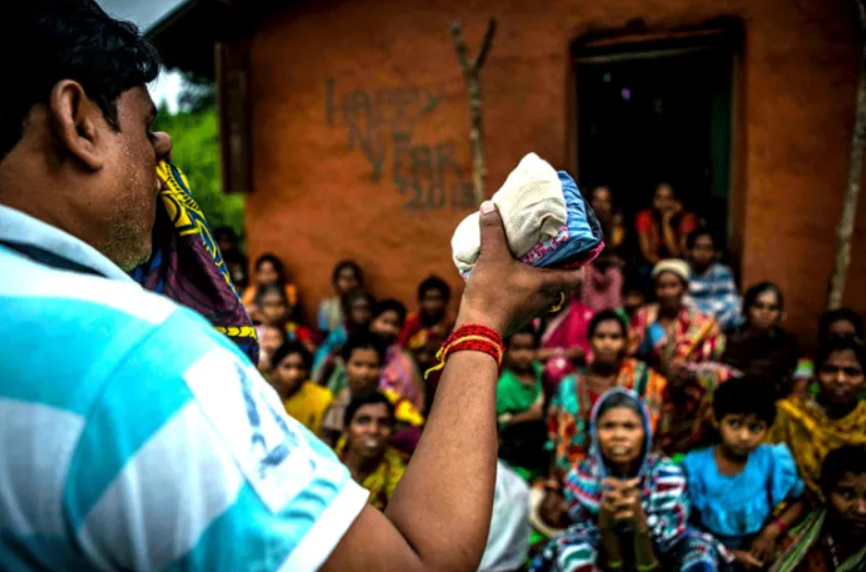IF one is to enlist the top innovations in the social sector in India, the NGO Goonj will most certainly find a place in this list. Anshu Gupta embarked upon a difficult journey to solve problems of resource scarcity in rural India, in the year 1999. He started Goonj as a bridge between resource rich urban population and those living in depravity in villages.
Goonj started operations on a unique and innovative model that focuses on the effective utilisation of underutilised resources and emphasises community participation. The organisation follows a three-step model: Collection, Sorting, and Distribution.
The uniqueness of this idea lies in the fact that it creates a barter between urban surplus and village communities’ labour, triggering large scale rural development work. To put it simply, the urban surplus that is provided to the rural population comes at a cost and that cost is participation in their own development. The entire process is undertaken in three stages namely:
Collection
Goonj’s model begins with the collection of material resources from urban households and corporates. These resources include clothing, household items, school supplies, and other essentials. Goonj encourages people to donate items they no longer need but are in usable condition. This approach not only reduces waste but also ensures that valuable resources reach those who can benefit from them.
Sorting
Once the donations are received, Goonj’s dedicated team meticulously sorts and categorises the items based on their usability and quality. This step is crucial to ensure that the donated resources are of good quality and suitable for distribution. Goonj takes pride in maintaining high standards of quality, ensuring that recipients receive items that are functional and dignified.
Distribution
Goonj believes in the power of dignity and respect when it comes to distributing resources. Instead of simply giving away the donated items, the organisation promotes a system of exchange called “Cloth for Work” or “Dignity for Work.” Under this initiative, communities are engaged in various development projects like building schools, roads, or wells. In exchange for their participation and labour, they receive the donated resources they need. This model fosters a sense of ownership, dignity, and community participation.
Goonj’s model also emphasises the importance of localised distribution. The organisation works closely with grassroots-level NGOs and community-based organisations to identify the specific needs of different regions and communities. This approach ensures that the resources are distributed in a targeted and efficient manner, addressing the most pressing needs of the beneficiaries.
Another notable aspect of Goonj’s model is its focus on creating a ripple effect of change. The organisation believes that its work should go beyond immediate relief and help create long-term sustainable solutions. By involving local communities in development projects and utilising their skills and labour, Goonj aims to build capacity and resilience within the communities it serves.
By leveraging the power of compassion and community engagement, Goonj is strengthening communities through initiatives in multiple verticals from education and health to livelihood generation and disaster relief.
Sanitation and hygiene
Goonj recognises the critical importance of sanitation in ensuring the overall well-being and dignity of individuals and communities. The organisation undertakes initiatives to address sanitation issues, especially in rural and underserved areas. Some key projects and activities include:
Cloth Sanitary Napkins (CSN) Initiative: Goonj promotes the use of reusable cloth sanitary napkins as a sustainable and affordable solution for menstrual hygiene. The organisation engages women and local communities in producing and distributing CSNs, thereby generating livelihood opportunities while addressing a pressing health and hygiene need.
Community Toilets: Goonj works towards building and renovating community toilets in areas lacking proper sanitation facilities. These toilets are designed to be gender-sensitive and accessible, promoting hygiene practices and improving overall sanitation standards within communities.
Menstrual Hygiene Management: Through awareness campaigns, workshops, and the distribution of sanitary pads, Goonj educates women and girls about menstrual hygiene management. The organisation emphasises breaking the taboo surrounding menstruation and promoting a healthy and hygienic approach to this natural process.
Livelihood Generation
Goonj recognises the importance of livelihood generation in empowering individuals and communities to lead sustainable and dignified lives. The organisation implements several projects and initiatives to support livelihood generation, including:
Rahat Kits: Goonj provides Rahat Kits containing essential items for survival and productivity to vulnerable individuals and communities. These kits include tools, equipment, and materials that can be utilised to generate livelihoods, such as sewing machines, carpentry tools, and agricultural equipment.
Cloth for Work: As mentioned earlier, Goonj operates its unique “Cloth for Work” model, where communities participate in development projects and receive donated resources in return. This approach not only addresses immediate needs but also creates opportunities for individuals to earn a livelihood by contributing their labour.
Skill Development Programmes: Goonj organises skill development workshops and training programmes to enhance the employability of individuals, particularly women and marginalised sections of society. These programmes focus on imparting vocational skills, such as tailoring, weaving, and handicraft production, enabling individuals to earn a sustainable income.
Environment and Sustainability
Goonj recognizes the importance of environmental conservation and sustainability. The organisation actively promotes initiatives to address environmental challenges and foster a greener future. Some of the key projects and activities include:
Green by Goonj: This initiative aims to address the issue of plastic waste and promote eco-friendly alternatives. Goonj encourages communities to collect and recycle plastic waste and provides training and support for creating useful products out of recycled materials.
Eco-bricks: Goonj promotes the concept of eco-bricks, which involve compacting single-use plastic waste into tightly-packed bricks. These eco-bricks are utilised for construction purposes, including building infrastructure for marginalised communities.
Tree Plantation: Goonj actively participates in tree plantation drives and campaigns to combat deforestation and promote a greener environment. By encouraging community participation and awareness, the organisation emphasises the importance of environmental stewardship.
Disaster Relief
When natural calamities strike, vulnerable communities often bear the brunt of their devastating consequences. Goonj has been at the forefront of relief activities across the country during major natural disasters, disaster relief being one of the NGO’s core functions. The organisation undertakes extensive relief operations by distributing essential items like food, clothing, blankets, and hygiene kits. Moreover, Goonj focuses on the rehabilitation and long-term reconstruction of affected areas, emphasising the involvement of local communities to ensure sustainable recovery.
Water rights
Access to clean water is a fundamental right, yet millions of Indians still lack this basic necessity. Goonj has worked extensively towards making water accessible to rural communities through several projects including desilting of ponds, digging of wells, village ponds and irrigation projects.
Through its initiative called ‘Jal Jeevan,’ Goonj promotes water resource management, rainwater harvesting, and the rejuvenation of traditional water bodies. By working closely with communities, the organisation empowers them to take charge of their water needs, enabling sustainable access to clean water and improving overall hygiene practices.
Educational empowerment
Education is a powerful tool that can break the cycle of poverty and pave the way for a brighter future. Goonj believes in the transformative power of education and works towards bridging educational gaps among marginalised communities.
The organisation supports schools in remote and underserved areas by providing essential infrastructure, learning materials, and scholarships. Goonj also actively engages with parents and teachers to promote the importance of education, fostering a conducive learning environment for children across India.
Access to Healthcare
Quality healthcare remains inaccessible for many people in India, especially in rural and marginalised communities. Goonj recognised the significance of healthcare initiatives in these areas and has worked tirelessly to protect the most underserved communities.
The organisation conducts health camps, awareness campaigns, and training programmes, focusing on preventive healthcare measures, maternal and child health, and sanitation. Goonj’s efforts aim to enhance healthcare infrastructure and empower communities to lead healthier lives.
The Goonj model is known for its commitment to resource optimisation, community involvement, and the promotion of dignity and sustainability. By leveraging the power of donated resources and engaging communities, Goonj creates a positive impact that goes beyond material aid, while urging people to take collective action for their own development.
Over the last 25 years Goonj has touched the lives of countless people and communities. Through its emphasis on community participation and sustainability, Goonj has created a model that inspires collaboration, resilience, and empowerment.
As India continues its journey towards progress, organisations like Goonj serve as catalysts for change, bringing hope and transforming lives along the way. If the impact of Goonj’s work inspires, you can join the movement as well. Click here to support the NGO.

Choosing to tread the proverbial road less travelled, Ramon embarked upon a career in journalism and spent over 8 years working for various media organisations. A deeper calling to create a sustainable impact in the lives of the less fortunate compelled him to join the social sector. Ramon is a minimalist at heart and an explorer in spirit.
Discover more from
Subscribe to get the latest posts sent to your email.

